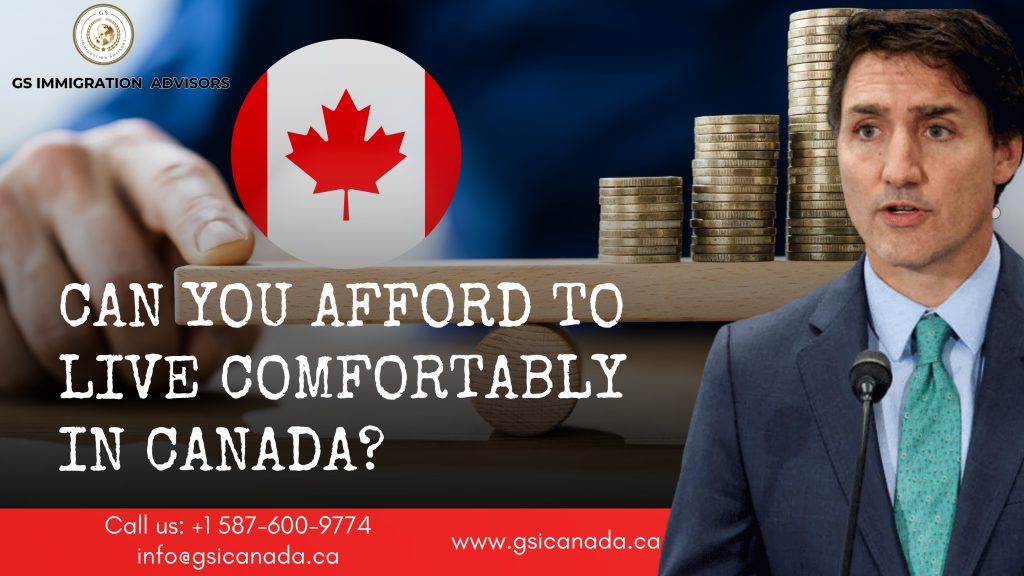CAN YOU AFFORD TO LIVE COMFORTABLYIN CANADA?
While the settlement funds recommended by Immigration, Refugees, and Citizenship Canada (IRCC) can assist you in covering basic living expenses, it’s important to understand how much you’ll need to truly thrive in Canada. Settlement funds are intended to help recent immigrants manage essential costs while they seek employment and housing. However, the cost of living can often be much higher, with conservative estimates indicating monthly expenses can exceed $1,500 before rent in many Canadian cities (source: numbeo.com). This article provides a breakdown of the cost of living in Canada, offering a rough guide on what you can expect to spend on essential expenses upon your arrival. Discover if You Are Eligible for Canadian Immigration Cost of Living Comparison: Toronto vs. Winnipeg To give you a clearer idea of what to expect, CIC News has compiled a table of monthly cost-of-living estimates based on crowdsourced data (source: numbeo) for both Toronto and Winnipeg. Toronto Living arrangement (including rent) Lower estimate monthly expenses Middle estimate monthly expenses Higher estimate monthly expenses Single person (1 bedroom apartment using public transport) $3,706.79 $4,446.91 $6,931.29 Single person with car (1 bedroom apartment travelling by car) $4,007.41 $4,879.61 $7,639.40 Single person (3 bedroom with roommates using public transport) $2,550.44 $3,253.35 $5,789.63 Single person with car (3 bedroom with roommates travelling by car) $2,851.07 $3,961.45 $6,497.73 Family of 4 (3-bedroom using public transport) $8,355.09 $10,778.30 $18,085.60 Family of 4 (3-bedroom travelling by car) $8,806.02 $11,427.36 $19,147.75 Winnipeg Living arrangement (including rent) Lower estimate monthly expenses Middle estimate monthly expenses Higher estimate monthly expenses Single person (1 bedroom apartment using public transport) $2,424.45 $3,088.07 $5,174.11 Single person with car (1 bedroom apartment travelling by car) $2,719.37 $3,506.83 $5,851.96 Single person (3 bedroom with roommates using public transport) $1,750.20 $2,377.57 $4,622.98 Single person with car (3 bedroom with roommates travelling by car) $2,045.12 $2,796.34 $5,300.83 Family of 4 (3-bedroom using public transport) $5,882.81 $8,043.22 $14,097.78 Family of 4 (3-bedroom travelling by car) $6,325.19 $8,671.36 $15,114.56 How Much Do You Need to Thrive in Canada? While the settlement funds recommended by Immigration, Refugees, and Citizenship Canada (IRCC) can assist you in covering basic living expenses, it’s important to understand how much you’ll need to truly thrive in Canada. Settlement funds are intended to help recent immigrants manage essential costs while they seek employment and housing. However, the cost of living can often be much higher, with conservative estimates indicating monthly expenses can exceed $1,500 before rent in many Canadian cities (source: numbeo.com). This article provides a breakdown of the cost of living in Canada, offering a rough guide on what you can expect to spend on essential expenses upon your arrival. Cost of Living Comparison: Toronto vs. Winnipeg To give you a clearer idea of what to expect, CIC News has compiled a table of monthly cost-of-living estimates based on crowdsourced data (source: numbeo) for both Toronto and Winnipeg. Toronto RentFor most newcomers, renting accommodation will be the largest portion of their monthly budget. Rental prices can vary widely depending on the neighborhood and type of property. In your first month, you will likely need to pay a security deposit, which is generally equal to one month’s rent. Below is a table showing the median monthly rent for major cities in Canada (source: zumper.com). GroceriesThe following table outlines the average minimum monthly budget for groceries in various major cities as of August 2024. The figures are crowdsourced and based on an adult consuming 2,400 calories a day on an omnivorous diet. The low estimate excludes dairy and reduces meat consumption, while the high estimate includes increased amounts of both. Actual grocery costs can vary significantly based on where you shop and the specific items you choose. Monthly Grocery Estimates (Crowdsourced Data) City Low Estimate High Estimate Toronto $300 $600 Winnipeg $250 $500 These figures highlight the variability in grocery costs based on shopping habits and dietary preferences. These figures can change significantly based on where you shop and what specific items you include in your monthly groceries. The table below shows estimates for the monthly cost of groceries based on crowdsourced data. Low estimate (Canadian dollars) Medium estimate (Canadian dollars) High estimate (Canadian dollars) Canadian cost of groceries per month (for one person) $412.04 $527.13 $660.53 Source: numbeo Travel In the metropolitan areas of Canada, most newcomers will rely on public transport to navigate the city. The table below shows the cost of an adult monthly transit pass for some of the major cities in Canada. All prices are gathered from the cities’ respective transport boards. City Price of monthly transit pass (in Canadian dollars) Toronto (ON) $156.00 Vancouver (BC) (3 zone pass) $193.80 Calgary (AB) $115.00 Montreal (QC) (all zone pass) $196.00 Halifax (NS) $90.00 Phone and internet Mobile data can be more expensive in Canada than in the country you are coming from. The table below shows the average cost of an unlimited nationwide talk and text plan along with 10-19 GB of data, sorted by some of the major provinces. Province Average price (in Canadian dollars) Nova Scotia $40.23 Quebec $55.12 Ontario $41.04 Manitoba $40.88 Saskatchewan $59.14 British Columbia $40.94 The following table shows the average monthly cost of an internet package with 33-100mbps Province Average price (in Canadian dollars) Nova Scotia $77.95 Quebec $55.97 Ontario $76.92 Manitoba $61.94 Saskatchewan $77.55 British Columbia $64.75 Source: Price Comparisons of Wireline, Wireless and Internet Services in Canada and with Foreign Jurisdictions: 2023 Edition From: Innovation, Science and Economic Development Canada Methodology *The data for this comparison was gathered using the numbeo cost of living estimator. We selected Toronto and Winnipeg as examples of cities where the cost of living is higher and lower respectively. The categories used to prompt the estimator were as follows. Single person (1 bedroom apartment using public transport)Lower estimateThe lower estimate was based on a hypothetical single person (1 bedroom apartment using public transport) with the following spending habits: Eating lunch or dinner in restaurants for 5% of their meals, with 100% of these being

